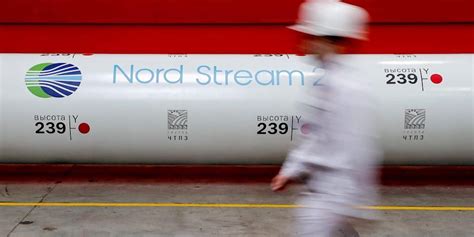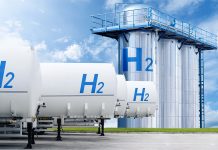Chancellor Olaf Scholz this morning halted Germany’s licencing of the completed Nord Stream 2 gas pipeline in reaction to Russia’s recognition of two rebel provinces in eastern Ukraine.
Oil prices had already surged today on news of Vladimir Putin’s recognition last night of Donetsk and Lughansk, breakaway puppet states on sovereign Ukrainian territory. Brent crude reached $98 per barrel in London trades by 11:00, its highest level since 2015.
Avoiding its predecessor’s land-based route into Europe, the £ 8.4 billion Nord Stream 2 runs for 1,200 kilometres under the Baltic, landing at Lubmin near Germany’s border with Poland, where it is planned to connect with EU-wide gas networks.
Russia’s Gazprom holds 50% of Nord Stream 2, with Shell and France’s Engie investing smaller shares.
At a press conference this morning with visiting Irish premier Micheál Martin, Chancellor Scholz announced he had asked Germany’s federal energy regulator the Bundesnetzagentur to halt the process for licencing the project.
“That sounds technical, but it is the necessary administrative step so there can be no certification of the pipeline and without this certification, Nord Stream 2 cannot begin operating,” Scholz said.
“Germany will now begin a new assessment of how it can meet its energy requirements, he said. “The situation has fundamentally changed.”
Further sanctions could follow against Moscow, the chancellor hinted.
“There are also other sanctions that we can introduce if further measures are taken, but for now, it’s a matter of doing something very concrete,” he told journalists.
Mr Scholz said that over the course of the day, the EU would conclude sanctions and that the bloc could be trusted to act quickly.
Since September Germany’s energy regulator had been delaying Nord Stream 2’s certification, objecting to Gazprom’s 50% ownership of both the new pipeline and of the gas it will carry. An alternative plan to re-register the venture’s ownership in Switzerland last month fell foul of the EU Commission.
Nord Stream 1 began operations in 2011. The Kremlin regards the land-based conduit as vulnerable to increases in transit fees by states it passes through, including Ukraine and Poland.
Ukraine’s president Vlodomir Zelensky last week warned Scholz in Kyiv that the new pipe was Russia’s ‘geopolitical weapon’ against the West.
Meeting Scholz in Washington on 7 February US president Joe Biden that the new project would be closed in the event of Moscow invading Ukraine. “I promise you we can do it”, he told reporters.
British prime minister Johnson told Parliament later that the UK is imposing economic sanctions on five Russian banks operating in London and on three wealthy individuals.




